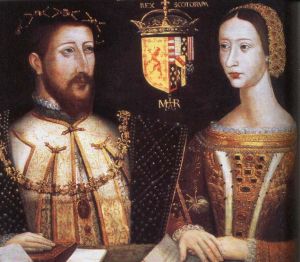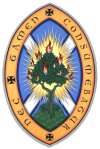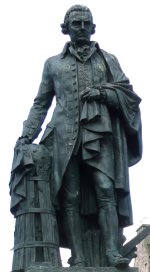450th anniversary of Protestant Reformation in Scotland
- Published in Society and Community Issues
2010 marked the 450th Anniversary of the Reformation in Scotland, one of the most significant events in Scottish history whose impact is felt to this day.
In August 1560 the Scottish Parliament ratified the Scots Confession of Faith and passed laws establishing the Scottish Reformation and the Church of Scotland.
The Parliament's decision not only meant the abolition of the Pope's jurisdiction in Scotland, but also marked a switch in international alliances away from Catholic France and towards Protestant England, eventually allowing the Union of the Crowns in 1603.
As the Church of Scotland took control all aspects of society, from moral discipline to education, the Reformation became a key event in Scottish history which shaped the character of the nation to this day.
Scotland: between Catholic France and Protestant England
 The sequence of events that led to the Scottish Reformation began when King James V died in 1542 and his French widow Marie de Guise became Regent of Scotland in the name of their baby daughter Mary Queen of Scots.
The sequence of events that led to the Scottish Reformation began when King James V died in 1542 and his French widow Marie de Guise became Regent of Scotland in the name of their baby daughter Mary Queen of Scots.
Religious life in Scotland was being affected by the events of the wider European Protestant Reformation, and Marie's regency started to be threatened by the growing importance of the Scottish Protestants.
Many in Scotland feared the Kingdom was becoming a French province as the high posts in the Court were held by Frenchmen and French troops were already stationed in Scotland.
In 1559 a Scottish clergyman called John Knox returned from exile to lead the Reformation in Scotland. Knox, who had been in exile working for the Church of England and studying with Calvin in Switzerland, favoured an alignment with the English protestant neighbours.
As fighting broke out between the Scottish protestants and the French, English troops entered Scotland to join the battle against the French garrisons. Regent Marie de Guise died shortly in June 1560 and in the subsequent Treaty of Edinburgh France and England agreed to withdraw both their troops from Scotland.
 On 17 August 1560, the Scottish Parliament approved John Knox's Scots Confession of Faith and on 24th August it passed the three Acts that changed Scotland from a Catholic country to a Protestant one.
On 17 August 1560, the Scottish Parliament approved John Knox's Scots Confession of Faith and on 24th August it passed the three Acts that changed Scotland from a Catholic country to a Protestant one.
Scotland's national Church is born
 The Reformation led to the creation of The Church of Scotland as the Scottish national church.
The Reformation led to the creation of The Church of Scotland as the Scottish national church.
Known by the Scots as The Kirk, The Church of Scotland established Calvinism as one of the dominant influences of Scottish life.
The strict Calvinist thinking promoted by the Kirk has sometimes been labelled as unforbearing and dogmatic. For example, the early Scottish reformers destroyed or damaged religious art at Scottish churches in iconoclastic riots and banned the use of music in worship.
However, the Kirk carried out important reforms such as translating the Bible from Latin and developing a basic level of literacy among the population so everybody could read the sacred texts.
The Kirk's commitment to universal education is widely credited to have played a crucial role in the creation of the world-class Scottish education system.
As a result, by the 18th century the Scots were the most literate people of Europe, with an estimated 75% rate of literacy.
Reformation was key to Scottish Enlightenment
 On the 450th anniversary of the Protestant Reformation, Scotland’s leading historian Tom Devine said that the ideals of the Reformation encouraged the advent of the Scottish Enlightenment.
On the 450th anniversary of the Protestant Reformation, Scotland’s leading historian Tom Devine said that the ideals of the Reformation encouraged the advent of the Scottish Enlightenment.
The 18th century Scottish Enlightenment was characterised by an extraordinary amount of intellectual and scientific achievements, with the likes of economist Adam Smith, geologist James Hutton, physician Joseph Black, and philosopher David Hume.
Devine, a professor at Edinburgh University, said the reformers had a profoundly positive influence on Scottish history:
"Its profound sense of egalitarianism ensured that there would, indeed, be a school in every parish, so that the people would have access to the beauty and the art of the holy texts."
"Complex theological issues were constantly debated in lengthy sermons, learned tracts and public debate."
"Scotland became characterised by fresh and dynamic thinking on law, philosophy and science."
"The Scottish Enlightenment's central focus on trying to understand the bases of human conduct, the ideas which evolved in time into the modern subjects of economics, sociology and anthropology, has its roots in Scottish Calvinism’s obsession with human morality and man’s relation to God."
Scottish Reformation had an influence abroad
The Scottish Reformation had a strong influence abroad as the Protestant values of the Scottish Enlightenment were carried across the Atlantic by the Scottish diaspora.
People of Scottish ancestry were behind a significant number of technological and social advances in the United States, Canada and New Zealand during the 18th and 19th centuries.
Scottish historian Tom Devine said "The Scottish Enlightenment, unlike its French counterpart, was therefore a decidedly Christian Enlightenment which is one key reason why it had such appeal to those Christian gentlemen across the Atlantic as they framed the constitutional foundations of the United States."
 In Ireland, Irish Presbyterianism was developed after the migrations of Scots to Ulster in the 17th century.
In Ireland, Irish Presbyterianism was developed after the migrations of Scots to Ulster in the 17th century.
Events held in Scotland to celebrate 450th anniversary
A programme of events have been commemorating the 450th anniversary of the Scottish Reformation.
The Scottish Government hosted a reception at Edinburgh Castle to acknowledge the role that the Kirk played in shaping the nation, while the Church of Scotland itself has organised a touring exhibition and released hundreds of years of Kirk Session minutes.
In Edinburgh, the National Library of Scotland held an exhibition of some rare texts and manuscripts relating to the Reformation, such as a copy of the 1560's Scots Confession of Faith and the 1576 Bassandyne Bible, the first complete vernacular Bible printed in Scotland.


